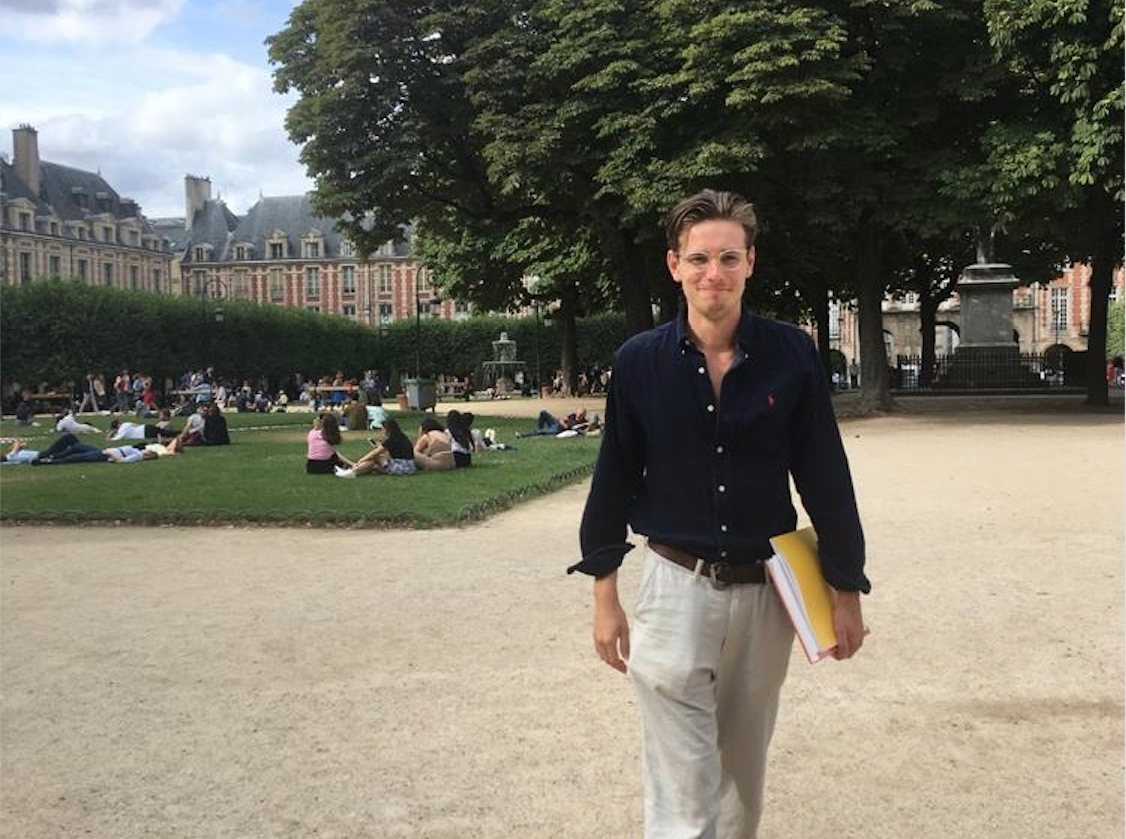PhD student wins prestigious research grant for US archive trip
“I’m deeply grateful to St John’s, I owe it a lot”
A St John’s PhD student who is researching the work of a prolific but little-studied Scottish architect is celebrating after a double dose of good news.
Ralph Wade, PhD Candidate in the History of Art, has won a Research Support Grant from the world-renowned Paul Mellon Centre for Studies in British Art, a UK educational charity based in London that is part of Yale University, in its competitive spring 2020 round of funding.
The award means Ralph can undertake a research trip to George Washington University in St Louis, Missouri, for his doctoral thesis, ‘The Country Houses of David Bryce: An Architectural and Cultural History’. There he will be able to examine Bryce’s unpublished manuscripts. “Bryce didn’t write or lecture much, so these are particularly important,” he said.
But that’s not the only good news to put a smile on his face. The timing is perfect because he has also been selected to represent his Department in the annual Cambridge-Columbia Symposium at Columbia University in New York. “I hope to make both visits together in the autumn, lasting about a month in total, and failing that, in the spring of ’21," he added.

Ralph has two scholarships from St John’s that support his doctoral work and has been fortunate to benefit from further funding. A Foundation Scholar after gaining his MPhil with Distinction (2017-2018), he is also fully funded by a St John’s College graduate scholarship. This was gained after he achieved the highest mark in his Department and a College MPhil Prize. He is due to finish his PhD in 2021.
David Bryce (1803-1876) was the leading Scottish architect of his day, and arguably one of the most prolific in British history. "He was a confident, even aggressive, Victorian designer, who reinvented the Scottish Baronial style – think castles! – at a time when Scotland was rediscovering its national identity after a long period of suppression," said Ralph. “He’s also largely unstudied – and with Scotland’s place in the United Kingdom as contentious as ever, this nationwide marginalisation of one of its major cultural figures can't continue!”
Last summer Ralph got a placement at UNESCO in Paris, within the Europe and North America division of the World Heritage Centre. These are internationally sought after and funding has to be found separately. “I was fortunate to win a Cambridge Careers’ Service Bursary for this, and then St John’s matched the funding,” he said.
While on placement Ralph dealt with the effects of the Climate Emergency on Venice, which is causing the city to sink, and on a new scheme to mitigate the impact of renewables on heritage or, as Ralph explained, “how to put up wind turbines in the Rhine Valley without wrecking it!”. He added: “It was fascinating insight into how heritage is treated at an international level, and the kind of diplomacy that underlies it."
After taking a First in History at Durham, he was drawn to St John’s for his MPhil. “As an architectural historian, the surroundings are just unbeatable but I’m mainly here thanks to the support of my supervisor Dr Frank Salmon, College Lecturer in Architecture and the History of Art and Director of Studies in History of Art,” he said. “St John’s is also exceptionally generous to its students; travel grants, in particular, have been vital to my research.”
In addition Ralph has found the College to be a supportive and caring place: “St John’s has supported me valiantly through periods of illness, so I’m a particular admirer of our tutorial system. I’m grateful for the sense of community that pervades John’s, whether in Chapel, the SBR, or a friendly face at a Porter’s Lodge.”
He has also really enjoyed academic life, supervising undergraduates, convening the Rickman Society and co-convening a lecture series in the Department. “I’m deeply grateful to St John’s, I owe it a lot.”
• Art historian and St John’s alumni Dr Christina J Faraday has been awarded a Postdoctoral Fellowship in the same round of spring awards made by the Paul Mellon Centre. Dr Faraday was awarded the Fellowship for her project ‘Liveliness in English Visual Culture, c1560-c1630’. She said: “I'm very excited to be taking up a six-month Postdoctoral Fellowship at the Paul Mellon Centre next year. It will be thrilling to join a worldwide community of British art scholars and be exposed to the latest thinking and research directions in the area. I plan to use the time to turn my PhD thesis on 'Liveliness in Tudor Art' into a book, and to get involved in the events and groups organised by the centre.”
Published: 20/05/2020